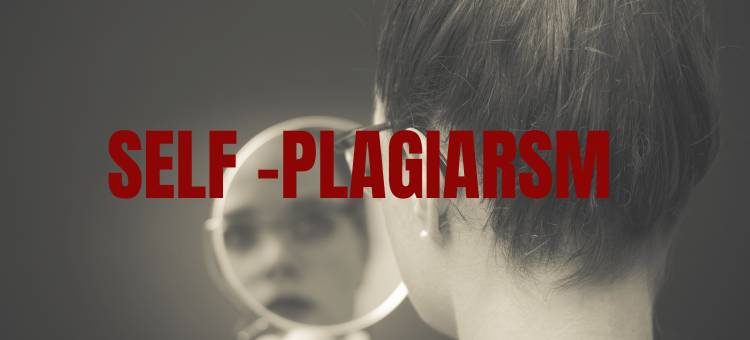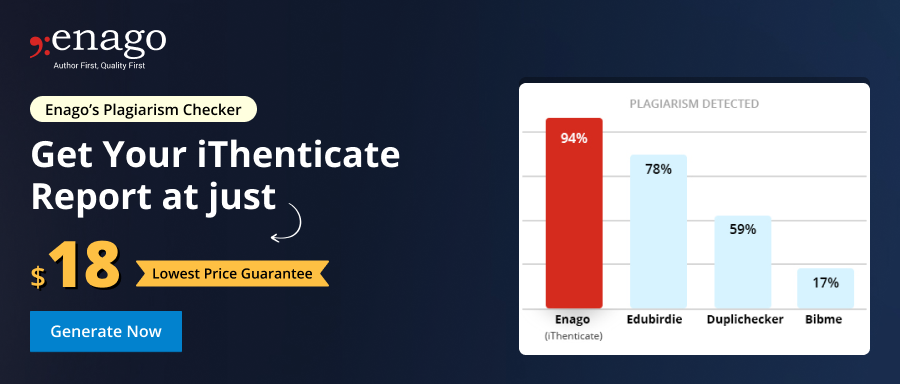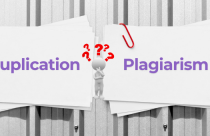Self-plagiarism: How Much Is Too Much?

Most researchers would say that plagiarism is never acceptable. They would probably also agree that some types of plagiarism are more serious than others. For example, complete plagiarism is where someone takes a project or paper created by someone else and presents it as their own. This is considered more severe than accidental plagiarism, where someone mistakenly copies someone else’s work. Additionally, there is another type of plagiarism where one might use excerpts from their previously published work, called self-plagiarism.
What is Self-plagiarism?
Can you plagiarize your own work? Yes! This is called self-plagiarism, which is when someone re-uses large parts of their own work, without citing the original text.
The nuances in the ethics of plagiarism and self-plagiarism are up for debate. However, many journals have clear guidelines on how much of the author’s previous work can be re-used in an article.
Some people think self-plagiarism includes re-using ideas or concepts from earlier works. Others think that it only means copying text or images.
Why do Some Researchers Self-plagiarize?
Self-plagiarism might not be the worst form of plagiarism, but it is certainly not widely accepted. So why do some researchers self-plagiarize? One answer might be found in the pressure on researchers to “publish or perish.” Many researchers face a lot of pressure to publish if they wish to advance their career or attract funding. This may lead some to be tempted to “cut corners” by re-using their own earlier work. This helps to boost their publication record without actually carrying out new research.
Some researchers may see nothing wrong with self-plagiarism. They might even think that, because they are the author, they can do what they like with their own work. Referencing your own work is, of course, normally acceptable – as long as it is properly cited. However, presenting previously published work as new, original content misleads the reader.
Is Self-plagiarism Acceptable?
Many in the academic research community frown on self-plagiarism. Using it to boost your own publication record, for example, might give you an unfair advantage over others. It might even have a wider effect, boosting your research group’s or institution’s publication record.
At a basic level, though, most self-plagiarism is dishonest. It is a way of misleading other researchers who work in your field. It is even considered by some to be a form of research misconduct. In addition, published research should be the most up-to-date knowledge available. If the article is re-using earlier work, this cannot be true.
Is Self-plagiarism Ever OK?
Although self-plagiarism is usually unacceptable, there are some situations when it is justified. For example, you might publish a very similar paper in two different languages. This makes the research available to a much wider audience, so it could be considered ok in this situation. However, the re-use of content still needs to be clear. The two papers should probably not count as two separate papers for the purposes of a publication record.
Another situation is when a researcher is asked to write a book chapter. Often, this will mean re-using material that has already appeared elsewhere, such as in a journal. In this case, the author can re-use their own work, as long as they cite the original source.
Some authors might consider that re-using their own work counts as “fair use.” This is the idea that small parts of a published work can be copied without permission, if the purpose is to comment on or critique the work, for example. However, this normally only applies to a very small amount of text or other content. The original source must be cited. Moreover, authors should think about who actually holds the copyright of their work. Often, journals hold the copyright of the articles they publish, not the authors.
Why is Self-plagiarism Wrong?
Self-plagiarism is one of the most disturbing situations of breach of scholarly publishing. Although it is not a theft from other authors, it deprives your readers and other researchers from exploring the pool of knowledge and ideas documented and published in different sources. It also hampers the fundamental right of the reader to access the origin of a source of information.
How to Avoid Self-plagiarism
If you want to re-use some of your previous work, how can you do it without risking self-plagiarism? The most important point is to always avoid being dishonest. Here are a few tips to help you:
- Check that your reasons for re-using your work are ethically sound. Why do you want to do it? Is it the best way to achieve what you want? Will re-using your work benefit others – or only yourself?
- Make sure you get the agreement of anyone else who contributed to the original work. This could include co-authors, editors, and publishers.
- Tell the new publications that you will be re-using some of your own work. Again, this could include co-authors, editors, and publishers. Make sure you have their agreement. You might need to use special wording to note their consent.
- Ensure that you fully cite the original work. It should be clear that the new article reproduces earlier content, and that you have the agreement of your co-authors, etc. This will stop readers from being misled.
- Later, make sure that you do not claim credit twice for the same work. For example, in your CV or in grant applications, you should point out the link between the two publications.
- Additionally, in case you miss out on citing your paper thoroughly even while using your own paper as a reference, you must use online plagiarism checkertools and cite where due.
You should also be prepared to defend your choice to re-use your own work, as it is likely to be questioned. Even if you have thought about all the points above, you could still run into problems. A journal might choose to reject your work on the grounds of self-plagiarism, even if you think your choice is ok; as in this case, for example.
What Do You Think?
In my opinion, researchers need to be very careful if they choose to re-use their own work. They should keep honesty in mind at all times if they are to avoid self-plagiarism. It is important that the reader is not misled. Furthermore, they should be sure that choosing to re-use their own work is truly of benefit to the scientific community. Perhaps, they should consider using the time and effort they would spend on avoiding self-plagiarism in new projects, instead.
Do you need to be sure that you have avoided plagiarism? Even the best plagiarism checker applications can be supplemented with a professional plagiarism check service for optimal results.
Do you think you have ever committed self-plagiarism? (Be honest!) Or have you spotted it in other’s work? Do you think self-plagiarism is an ethical problem, or should researchers be free to re-use their own work? Share your thoughts and opinions in the comments below. You can also visit our open platform for frequently asked questions related to different aspects of research writing and publishing answered by our team that comprises subject-matter experts, eminent researchers, and publication experts.










